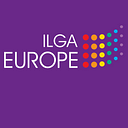No news is not always good news: the deadlock on LGBTI rights in Europe
Published on May 17, ILGA-Europe’s Rainbow Europe Map & Index 2021 reveals a disturbing stand-still on LGBTI human rights across Europe. But what are the reasons for this deadlock, small advancements and worrying regressions, and navigate more maps on LGBTI rights in the region.
For the first time since ILGA-Europe published its first Rainbow Map in 2009, which benchmarks every European country on the legal and policy situation of LGBTI people, we have seen no positive change in 70% of the region.
The reasons behind the stand-still
It would be easy to blame COVID-19 for the almost complete lack of legal progress, but the reality is far more complex. Although the global health crisis has certainly played a role, we already reported a growing stagnation of LGBTI rights last year, before the pandemic spread in Europe. Besides, it was clarified in Europe that a difficult health context shouldn’t be an excuse to put human rights on the back-burner. During the worst of the COVID-19 crisis, the European Commission kept human rights on the agenda, leading by example with the adoption of the EU LGBTIQ Equality Strategy in November 2020, the first of its kind.
The truth is that in many countries progress has stopped because there’s increased political polarisation on LGBTI issues, because some elected officials no longer see gains to be made by supporting LGBTI equality, and because governments don’t see it as a priority issue. Meanwhile LGBTI people across Europe, and not only in the most media reported countries like Poland, Hungary and Turkey, are experiencing more political repression, difficult socio-economic conditions and an increase of LGBTI-phobic hatred online and in the streets.
The good news is that there are systems for change already in place
In at least 15 countries there are legislative proposals and action plans on the table, waiting to be adopted and implemented by political representatives. If governments choose to do the right thing, the map can look positively different next year. Their response against the current backlash on LGBTI people must be more and better concrete action, because human rights simply cannot be something you drop when circumstances are challenging.
In some countries there has been a little positive progression
· Bosnia & Herzegovina and North Macedonia improved the safety in LGBTI events, so LGBTI people are better protected when exercising their right to freedom of assembly.
· Portugal and Northern Ireland revoked all restrictions on LGBTI people for blood donation.
· Iceland implemented legal recognition for non-binary people.
· Malta added sex characteristics under protected grounds in the Refugees Act and published new guidelines for LGBTI asylum seekers.
· Albania included sex characteristics protection in anti-discrimination legislation.
But in almost two thirds of Europe, there is a worrying stand-still and regression, including…
- Not one country moved on partnership or parenthood recognition.
- No change for intersex and trans rights apart from Iceland.
- Denmark had the most dramatic drop in its score, as access to trans-specific healthcare is still linked with a mental health assessment in the country.
- Georgia also dropped due to the lack of clear procedure for legal gender recognition and for not protecting LGBTI human rights defenders at risk.
- For the second year in a row, Poland is the last EU country in the ranking. It lost points because LGBTI people are being actively attacked by the police in public events and due to LGBT-free zones resolutions adopted by several Polish towns.
More benchmarking maps
Did you know that other organisations publish benchmarking maps on LGBTI rights too? Check these ones out!
- TGEU’s Trans Rights Europe Map : https://transrightsmap.tgeu.org
- OII-Europe’s Intersex Good Practice Map: https://oiieurope.org/good-practice-map-2020/
- European Forum of LGBT Christian Groups’s Rainbow Index of Churches in Europe: https://inclusive-churches.eu/
- ILGA World’s Sexual Orientation Laws in the World Map: https://ilga.org/maps-sexual-orientation-laws
To find out how your European country fared in the 2021, Rainbow Europe Map & Index, click here.
